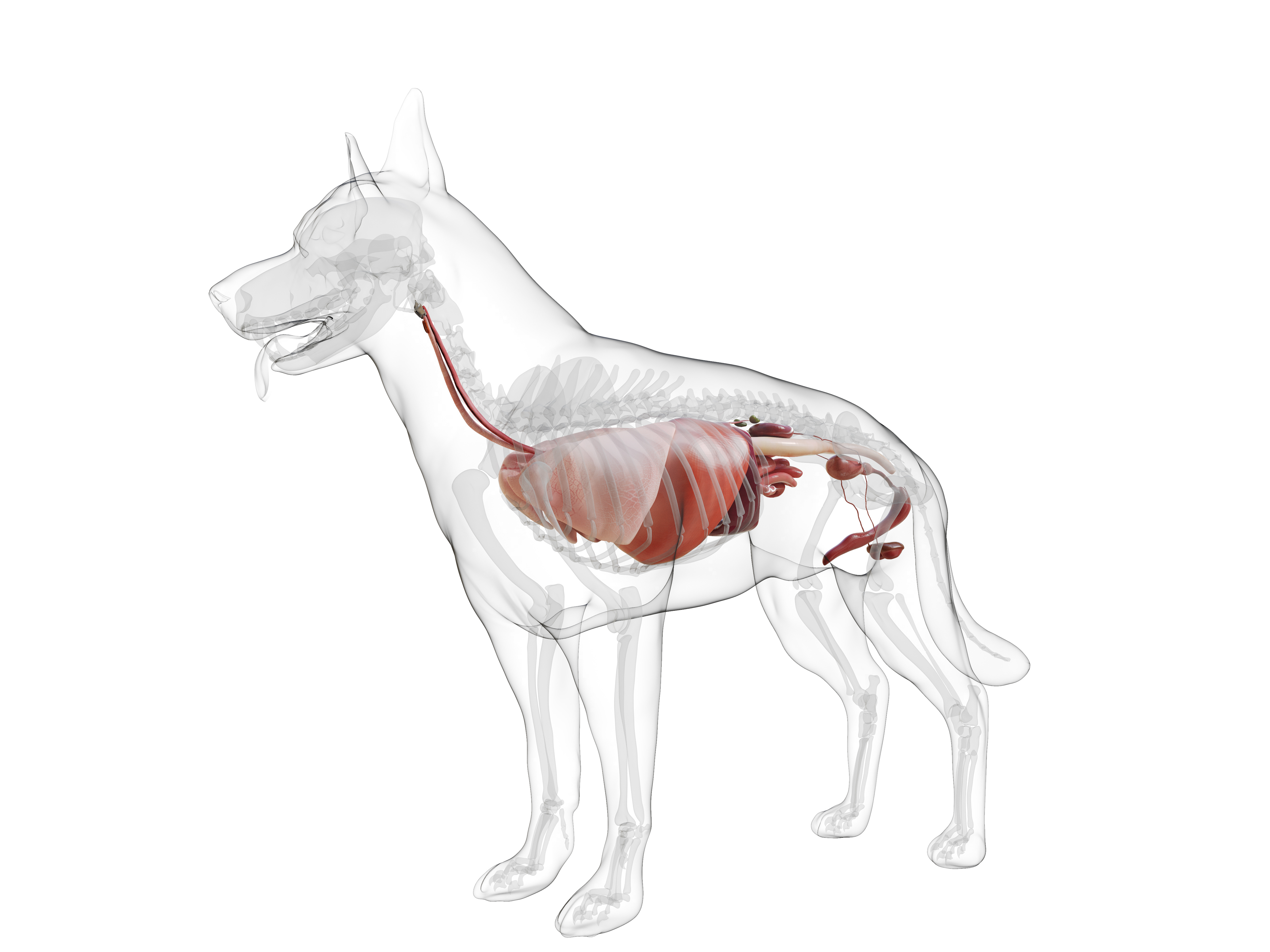
Anytime I go for a slice of pizza, a grilled cheese, or anything else with a lot of dairy, I know it’s a bit of a mixed blessing. Boy do I love those foods, but boy will I regret it later.
What most of us wouldn’t give to digest some things just a little better. And while I wouldn’t recommend feeding pizza to your pup, chances are if you’re reading this article, your furry friend has some regular digestive issues even on her own diet, that keep her far from “regular”.
It’s no wonder digestive enzymes are becoming more popular in both the human and pet health markets. But as with any supplement, it’s important to know what they are and when they’re most appropriate to use as an aid in digestion.
In this article, we’re going to review what digestive enzymes are, what different ones actually help to digest, and some opinions from veterinary experts on when they are most appropriate to use.
What’s a Digestive Enzyme?
A digestive enzyme is a protein that binds with food components, like dietary protein, fats, and carbohydrates, to break them down into smaller pieces that can be better absorbed by the body.
There are countless enzymes all over our body responsible for countless functions like energy production in cells, hormone function, and tissue repair, not just digestion. They all serve to speed up chemical processes within the body and without them we simply wouldn’t be able to live.
Digestive enzymes are just one class of these vital proteins, which help to make sure our bodies and our pets’ bodies can get nutrients from the foods we eat.
There are four main digestive enzymes. Proteases break down protein, amylases break down carbohydrates, and lipases break down fat. Cellulases, which carnivores and omnivores like dogs, cats, and humans don’t produce, help to break down cellulose in plant material.
Each digestive enzyme class has a few different specific enzymes under its umbrella. For example, pepsin is a protease produced by the stomach to break down proteins while trypsin and chymotrypsin–also proteases–are produced by the pancreas and work more in the small intestine.

Where Are Digestive Enzymes Produced?
A majority of digestive enzymes are produced by the pancreas, but they can also be found in a couple of other places too, including the stomach, and the small intestine.
Digestion is a stepwise process. We first break down food by chewing it up into small bits. Saliva in our mouths (which has usually already jumped into production by those wonderful smells wafting from the kitchen, or the sound of a pet food can opening) starts to moisten and break down those bits with the aid of ptyalin, one of several types of amylase.
When food moves into the stomach, stomach acid breaks down quite a lot of it. The protease pepsin helps to break down protein components. When food is broken down sufficiently, it gets sorted out of the stomach into the small intestine, where digestive enzymes secreted by both the pancreas and small intestine break food nutrients down into their smallest components that can then be absorbed by the small intestine into the body where they can be used by cells for all of their needs.
If Our Bodies Make Digestive Enzymes, Why Supplement Them?
It’s a great question, and the answer is hotly debated, especially by animal health experts.
Normal, healthy pets with normal digestion typically don’t need digestive enzymes added to their diet, as their pancreas, stomach, and small intestine are doing just fine taking care of the business of digestion.
But there are certainly some cases where digestive enzymes may be deficient or are not being produced in sufficient quantity.
Pancreatic Insufficiency
If the pancreas, which is responsible for producing most of the body’s digestive enzymes, is either damaged or dysfunctional, enzymes must be supplemented for just about anything to be digested properly.
Exocrine pancreatic insufficiency (EPI) is a disorder where the pancreas is unable to produce sufficient enzymes to support normal digestion. It is a disorder that can be inherited or genetic in certain dog breeds, especially in German Shepherd Dogs, but can technically affect any dog. It can also result from inflammation or injury to the pancreas, called pancreatitis, especially in very severe acute cases, or very chronic, recurrent cases.
EPI is the only truly recognized pancreatic enzyme disorder in dogs (and cats) and can be diagnosed with a blood test. Signs of EPI are fairly severe, involving noticeable weight loss despite a normal or ravenous appetite, and fatty, pale-looking stools, termed steatorrhea. But fortunately, EPI is considered to be a fairly rare disease.
Losing Enzyme Capacity as We Age
It’s generally appreciated that with advancing age, humans may produce fewer digestive enzymes.
A very classic example is lactose-intolerance. A large majority of us, as well as our pets, are born with the ability to digest milk and dairy through production of the enzyme lactase by the pancreas. This is largely because nursing is vital to good health and immune function for all infant mammals. We all need mom’s milk when we’re babies and in early growth stages.
But also in a large majority of us, the amount of this enzyme that continues to be produced by the pancreas decreases over time. Most babies and children have plenty of lactase to continue consuming milk products without issue, but by the time we reach adulthood, many of us start to have some digestive trouble after a cool glass of milk or an extra-cheese pizza.
Hence the popularity of lactase products, like Lactaid, which allows us to continue to enjoy that extra-cheese pizza or a huge bowl of ice cream.
While it has its nutrition benefits (and some flavor would be lost in life by giving it up), consuming dairy products is not necessary for life. After weaning from their moms, our pets certainly don’t need dairy to survive either.
But losing the ability to produce lactase pales in comparison to losing production of our other important digestive enzymes needed for all foods. Anything our enzymes can’t break down move out of the small intestine into the colon where bacteria try to break them down instead, leading to bloating, gas, and stool problems.
The loss of enzyme production and function in pets with age is not fully appreciated or understood, but some veterinarians feel this likely does occur to some degree.
Changing Foods
Every consistent diet is going to contain a certain percentage of each of the main nutrients: protein, carbohydrates, and fats.
This is especially true of commercial pet foods. Most commercial pet foods are properly formulated to meet nutritional requirements (make sure to look for the AAFCO nutritional adequacy statement to make sure) but the percentages of these nutrients can still vary.
There can be many reasons a pet parent may wish to change diets. We may determine there is a dietary allergy or sensitivity or another medical condition may necessitate changing formulations. A pup may simply no longer enjoy eating a particular diet, or a well-meaning pet parent may just see the most amazing food during a tv commercial or get advice from a friend about a new diet and decide to give it a try.
Whatever the reason, changing from one diet to another can be difficult on the digestive system if it has acclimated to a certain distribution of nutrients, both from an enzyme production perspective, as well as intestinal bacterial populations. This is why it’s always important to slowly transition to a new diet over at least one week to avoid signs of digestive upset like diarrhea.
But in addition to transitioning foods, adding in a digestive enzyme supplement is championed by some on a short-term basis while changing diets to help food digest better while the pancreas adjusts and rolls out more of the enzymes required.

The Digestive Debate: Are Enzymes Appropriate for My Dog?
Ultimately, this is a discussion best kept between you and your veterinarian. Like most supplements, digestive enzymes should be considered in cases where they are likely to be most beneficial. So if you feel that your pup could benefit from using them, make sure to chat with your vet about what you’re seeing and the concerns you have.
Remember that signs of indigestion like gas, bloating, vomiting, and diarrhea, can have many causes. The most important way to address them is to try to identify the underlying cause, and your vet is the best person to help you figure that out.
In this next section, we will review some general opinions that veterinary professionals have regarding digestive enzymes. As mentioned, their use in pets is hotly debated, so it’s important to understand these perspectives when trying to decide if a digestive enzyme supplement is appropriate for your pup.

The Holistic View: Seeing is Believing
Most proponents of digestive enzymes, in both humans and pets, are alternative medicine or holistic veterinary practitioners that see these benefits anecdotally in practice with their own patients.
In an article on the topic, alternative medicine veterinary practitioners Steve Marsden, Shawn Messonnier, and Cheryl Yuill discuss the benefits that they see in practice and indications for digestive enzyme supplementation.
They indicate that digestive enzyme supplementation may be used for pets in cases of gastrointestinal disease or through a normal process of depletion of enzymes through the aging process. Certain disorders may arise from poor digestion, like food sensitivities, cutaneous adverse food reaction (commonly known as food allergies), and stool-eating behavior (coprophagy). In addition, conditions like stress, systemic illness and inflammation, and the use of certain medications may lead to digestive imbalance that may be at least partly helped by the use of digestive enzymes.
Many holistic practitioners also believe that optimal digestion may depend on the enzymes found naturally in whole foods like grains and fruits, but which are destroyed during the dry and canned pet food manufacturing process.
There are also theories that since enzymes can have additional functions throughout the body, that a deficiency of enzymes found naturally in whole foods may place a greater burden on the body’s metabolism.
Besides aiding in digestion, holistic practitioners feel that digestive enzymes, especially those found in whole foods, can provide additional benefits in other parts of the body too.
Papain, the enzyme found in papaya has been shown to be as effective as the anti-inflammatory aspirin in several studies according to the authors. And bromelain, the plant enzyme extracted from pineapple, has also shown to have anti-inflammatory properties useful for skin allergies and arthritis.
In older pets, immune function is generally appreciated to decline with age. And while studies may be lacking to support this specifically in pets, there is a thought that plant enzyme supplementation may lead to increased zinc levels and improved immune function in both people and pets.
In general, Drs. Marsden, Messonnier, and Yuill see evidence in their own holistic practice and through their colleagues that digestive enzymes are very beneficial for addressing disorders associated with poor digestion and that they are extremely safe to use.
The Traditional View: Where’s the Science?
There is another camp of thought regarding digestive enzymes that sees less benefit in their use and encourages more precautious supplementation.
The clinical nutrition team at the Cummings Veterinary Medical Center at Tufts University, in their article on digestive enzymes conveys the opinion that there is little scientific basis to back up their use.
The concept of “helping out the pancreas” because it “can’t keep up” with digestive enzyme production is false according to the nutrition team, because there are no studies that support the idea that the pancreas ever runs out of enzymes or has trouble keeping up with making them.
The only condition that would indicate the use of digestive enzymes, according to their article, would be true exocrine pancreatic insufficiency, as diagnosed using specific lab work, in which case a prescription strength animal-based enzyme product is typically used vs. what are most often plant-based supplements.
In a 2017 study published in the Journal of Nutrition Science, dogs provided either a plant-based digestive enzyme supplement, an animal based supplement, or no supplement at all, had no measurable difference in the digestion of protein, fat, or carbs.
In response to the claims that the natural enzymes in food are important to aid in digestion–natural enzymes that are lost with cooking or processing–the nutrition team states that these enzymes have more to do with why food spoils than having anything to do with digestion by the body. Thus “killing” these enzymes by cooking makes little difference in digestibility.
And in addressing safety, they do raise some points of concern. Some side effects have been reported in healthy pets receiving digestive enzyme supplements, including oral ulceration, vomiting, and diarrhea. And because supplements are generally not FDA regulated, they also quote concern about the consistency and quality of ingredients.
Another long-standing concern that then gets raised is whether or not, in response to long-term supplementation with additional digestive enzymes, the pancreas might downregulate, or scale back, its production of its own enzymes, which could then lead to a dependency on supplementation.

Digesting the Evidence: Are Enzymes Okay for My Dog?
So what do these conflicting views mean for your pup, and is it okay to use digestive enzymes?
As with most things, the truth lies somewhere in the middle.
There are no scientific studies that support digestive enzyme use in pets, except those rare cases when EPI is truly diagnosed. However, there is a great deal of anecdotal evidence based on use by veterinarians in practice and pet owners at home, where benefits are certainly seen.
Because our clinical experiences treating pets in practice shapes how we continue to practice medicine just as much as the next newest scientific article that gets published, anecdotal evidence is always important to consider. If your vet has a lot of experience using digestive enzymes, it’s important to discuss when he or she finds them to be of the most benefit.
As far as side effects go, it’s always important to remember that adverse effects can be seen with anything new that you give your pet. We certainly see allergic reactions to vaccines and prescription medications in veterinary practice, and the same can be true for supplements. But side effects are fortunately very uncommon, and don’t appear to be any more common for digestive enzymes than for any other supplement out there, as long as it’s of high quality.
Could long-term use of digestive enzymes cause the pancreas to decrease production of its own enzymes? It’s possible in theory based on how other negative-feedback systems, like hormone regulation for example, work in the body. There are no long-term studies in dogs that prove that this occurs, but does perhaps suggest that shorter term use of digestive enzymes is more appropriate except in cases where we think pancreatic function is already impaired.
And as the clinical nutrition team at Tufts suggests, it is important to know where your supplements come from, their quality, and consistency. That’s why you should always look for the National Animal Supplement Council (NASC) quality seal. NASC member companies, like Healthy Solutions for Pets, are required to meet the highest standards in quality, consistency, including rigorous 3rd party auditing of their facilities.
So while your average young, healthy pup with no digestive issues at all may not see a lot of benefit from digestive enzymes, there are cases, like age-related changes with digestion and diet transitions, where they can be helpful.
If your pup is going through some difficult food transitions, has chronic digestive health issues, or if your pup seems to be having more digestive issues with age, ask your vet if a digestive enzyme supplement like Probiotic Soft Chews with Enzymes and Prebiotic could help.
And remember, there are a lot of digestive disorders out there and the best way to address them is to have your vet help you find out the underlying cause. But a trial of digestive enzymes will not hurt, and if you see beneficial improvements in digestion and health, you and your vet can decide together the pros and cons of continuing long term.
About Us
We've taken the guesswork out of caring for your pets. Our formulations are created by experienced veterinarians to address specific solutions for a variety of pet issues.
All of our products are:
As seen on:











